
Citrus pectin manufacturer
Citrus pectin manufacturer for jam and candy
Citrus pectin manufacturer is a soluble fiber in fruits and vegetables. Especially in apple peel and citrus peel. It is a powerful gelling agent used to thicken jams and jellies, and can also be used to make sweets.
Specification
| Product parameters | Test standards | Test results |
| Appearance: light yellow powder | ||
| White powder qualified | ||
| Particle size | ≥95% | Pass 60 meshes Qualified |
| Gel degree (USA-SAG, °) | 150±5° | 151° |
| Galacturonic acid% | ≥ 65.0 | 91.5 |
| Weightlessness% | ≤ 10 | 7.0 |
| Ash content% | ≤ 5 | 2.5 |
| Esterification% | 66-72 | 70.8 |
| Hydrochloric acid insoluble matter% | ≤ 1 | 0.16 |
| PH (2.5% water solubility) | 2.6-3.0 | 2.8 |
| Heavy metal (Pb) mg/kg | ≤ 15 | <15 |
| Arsenic mg/kg | ≤ 2 | <2 |
| Lead mg/kg | ≤ 5 | <5 |
| Sulfur dioxide% | ≤ 0.005 | <0.005 |
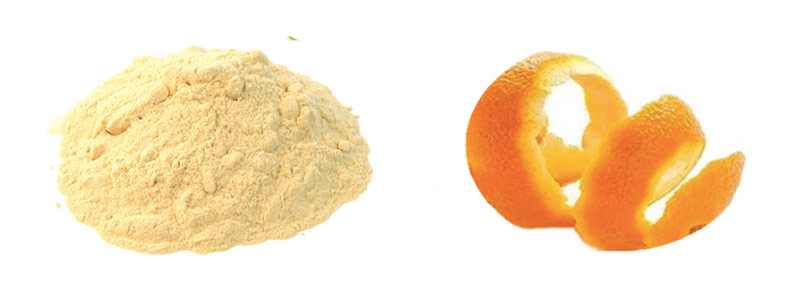
The efficacy and role of citrus pectin
Supplementing citrus pectin can provide some potential health benefits.
1.Improve blood sugar and blood lipid levels
Some studies on mice have shown that citrus pectin can lower blood sugar levels. Improve the function of blood sugar-related hormones, thereby helping to control type 2 diabetes. However, studies on humans have not observed the same powerful blood sugar control effect. Citrus pectin can also increase blood lipid levels by binding to cholesterol in the digestive tract. Prevent cholesterol from being absorbed, thereby reducing the risk of heart disease. In a study of 57 adults. Those who consumed 15 grams of citrus pectin per day had a 7% lower LDL (bad) cholesterol compared to the control group. Animal studies have also proven the ability of these supplements to lower cholesterol and blood lipids. However, we need more research to better understand how citrus pectin affects blood sugar and fat levels.
2.Reduce the risk of colon cancer
In test-tube studies, citrus pectin killed colon cancer cells. In addition, this fiber helps reduce inflammation and cell damage, which can trigger the formation of colon cancer cells, thereby reducing the risk of colon cancer. Researchers speculate that citrus pectin can reduce the risk of colon cancer by binding to galectin-3 and inhibiting its absorption. High levels of galectin-3 are associated with an increased risk of colon cancer. Test-tube studies also show that citrus pectin can kill other types of cancer cells, including breast cancer, liver cancer, stomach cancer, and lung cancer cells.
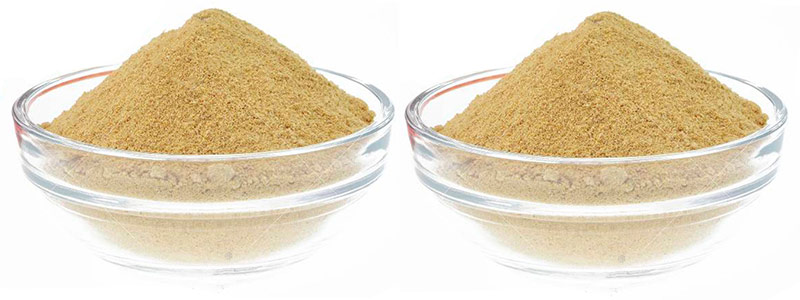
3.Promote a healthy weight
Citrus pectin can also promote a healthy weight. In human studies, increased fiber intake is associated with a decreased risk of overweight and obesity. It’s believed that this is because fibers are fillers and most. High-fiber foods have lower calories than low-fiber foods such as refined grains. In addition, animal studies have shown that citrus pectin supplements can promote weight loss and fat burning in obese rats. Specifically, a study in rats found that citrus pectin can promote satiety and reduce calorie intake more than a high-protein diet. Similar studies have also found that citrus pectin increases satiety or satiety hormone levels in mice.
4. Contribute to digestive tract problems
As a soluble fiber with unique gelling properties, citrus pectin is benefit for digestion in many ways. In the presence of water, soluble fiber becomes a gel in the digestive tract. Therefore, they can soften stools, speed up the transit time of substances through the digestive tract, and reduce constipation. In addition, soluble fiber is a prebiotic and a food source of healthy bacteria in the intestinal tract.
In a 4-week study of 80 patients with slow transit constipation, those who consumed 24 grams of citrus pectin per day had healthy bacteria in their intestines. In addition, some animal studies have shown that these supplements can improve the health of intestinal bacteria, thereby reducing inflammation and improving gastrointestinal symptoms. In addition, this unique fiber may form a protective barrier around the intestinal wall to prevent harmful bacteria from entering your body.
The process of making jam with citrus pectin
The materials of making jam
1.Fresh fruits with a volume of about 1.5 liters (such as strawberries, blueberries, apricots, etc.)
2.A pack of citrus pectin powder
3.About 900 grams of sugar (if the fruit is bitter, such as oranges, then use about 1150 grams of sugar
4.60 ml lemon juice
5.About 2.5 grams of butter or margarine
Make jam with citrus pectin processes
1. Prepare fruits. First, wash the fruit under the faucet, and then process the fruit into an edible appearance, which needs to be peeled and peeled, which needs to be pitted, and which needs to be pitted, and the stem is removed, etc. Then, cut the fruit into easy-to-handle pieces.
2. Crush the fruit. After washing and preparing the fruit, set aside some time for the fruit to dry, and then use a potato masher or wooden spoon to mash the fruit. The time to pound the fruit depends on the type of jam you want to make. If you want a thicker, fruity jam, just mash it for a minute or two. And if you want a finer texture, then pound it for 3 minutes.
3. Put the fruit in a suitable size soup pot or saucepan. First, put the fruit with a volume of about 1200 ml into the pot, then add lemon juice and butter. Add about 40 ml of lemon juice and 5 ml of butter or margarine. Gently stir the ingredients together. You can heat the butter to make it easier to stir. Lemon juice will reduce the sweetness of the jam.
4. Boil the mixed fruit ingredients. Thorough boiling means that when you stir, the foam will not disappear or decrease. Start stirring constantly from the bottom to prevent the fruit from sticking to the bottom of the pot and burning. After boiling, the juice can flow out of the fruit and prevent the pot from scorching.
5. Pour in sugar and citrus pectin. Do not turn off the heat, pour the sugar into the pot, continue to stir, and let the sugar melt completely. You will notice that after adding sugar, the fruit will become lighter and more transparent. Continue to stir without interruption. According to this formula, if you use 1200 ml of pulp, you need to add 600 ml of sugar (the ratio of sugar to fruit is 1:2). But know that this ratio is not fixed. If you are using bitter pulp, such as oranges, then the ratio should be 2:3, that is, add 300 ml of sugar for every 450 ml of pulp.
6. Let the jam simmer for 5-20 minutes, until the texture becomes thick, similar to syrup. Continue to heat on low heat until the texture of the jam is completely desired. The time required depends on the type of fruit selected. Some fruits take a long time to become soft enough.
7. Turn off the fire. When the ingredients are in the right state, turn off the fire and remove the pot from the fire.
8. Use a spoon to scrape off the bubbles or foam on the surface. The color of the foam is whitish, and sometimes a batch of boiled foam will foam more than other times. You don’t need to completely remove all the bubbles. But if you ignore the foam completely, it will affect the consistency of the jam and the taste will not be very good.
9. Scoop the jam or jelly-like jam into the prepared jar. Use a canning funnel to make it easier to fill the jam into the jar. Remember to leave a space of about 3 mm at the top of the can, also called “can head clearance”. Use a damp cloth to wipe off the remaining jam on the can mouth and spiral part, especially the sealed area.
Steps to use citrus pectin to make raspberry fudge
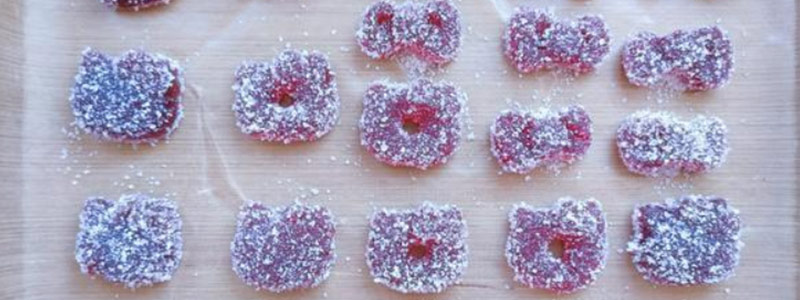
The materials needed
1.Raspberry Fruit Puree 250g
2.Sweet juice garden caster sugar 250g
3.50g glucose syrup
4.7 grams of citrus pectin
5.Citric acid 4 grams
6.4 grams of water
The production steps of using citrus pectin to make raspberry fudge
1. Prepare all kinds of ingredients. Pour the citric acid into the same amount of water to dissolve, mix the granulated sugar and citrus pectin well (so as not to agglomerate when poured), and set aside for later use.
2. Pour the pureed fruit into a small pot, heat it on a medium-low heat, and stir it until small bubbles are generated. Slowly pour the granulated sugar mixed with citrus pectin into a small pot, stirring constantly while pouring, until all is poured in and mixed well.
3. Pour the glucose syrup again, mix well and continue heating to 107°C. When the thermometer shows 107°C, immediately pour the citric acid melted with water, mix well and pour it into a silicone mold.
4. Let it cool or refrigerate for half an hour, then it can be demoulded. Put the fudge in a large bowl filled with caster sugar or powdered sugar (outside of the indicated amount) and roll it so that all sides are evenly covered with caster sugar. Don’t put too many pieces at a time to avoid sticking. The finished jelly can be stored in a cool and dry airtight jar at room temperature (24-28°C) for about 1 month.
What is pectin?
Citrus pectin manufacturer is a unique fiber in fruits and vegetables. Pectin is a kind of natural high molecular compound, which mainly exists in all higher plants and is an important component of plant cell interstitium. Pectin is a kind of soluble fiber, called polysaccharide, which is a long list of indigestible sugars. When pectin is heated in a liquid, it swells and turns into a gel, making it a thickener for jams and jellies. After ingestion, it can also gel in your digestive tract, providing many health benefits.
Nutrition and use of citrus pectin
Citrus pectin manufacturer is a fiber that contains few calories or nutrients. It is a main ingredient in jams and jellies and is used as a soluble fiber supplement.
Use of citrus pectin
Citrus pectin is mainly used in food production and home cooking as a thickening agent. It is added to commercially produced and homemade jams, jellies and preserves. It can also be added to flavored milk and drinkable yogurt as a stabilizer. In household kitchen cooking, citrus pectin is sold and used as a white or light brown powder or colorless liquid. Citrus pectin is also used as a soluble fiber supplement and is usually sold in capsule form. Soluble fiber can help relieve constipation, lower cholesterol and triglyceride levels, improve blood sugar, and promote a healthy weight. Finally, this fiber is a main component of the release coating time in some drugs.
In addition, citrus pectin can also be used as a thickener and stabilizer as a food additive. It is widely used in high-end beverages, yogurt, jam, jelly, and jelly. With the medical health care of citrus pectin, as well as the application and development of external cosmetics, bread baking and other fields, the world market demand will be greatly improved. For example, as an additive in flour, citrus pectin greatly improves the ductility of the dough, effectively captures the carbon dioxide released by fermentation, and greatly improves the fluffy, taste, and shelf life of bread.
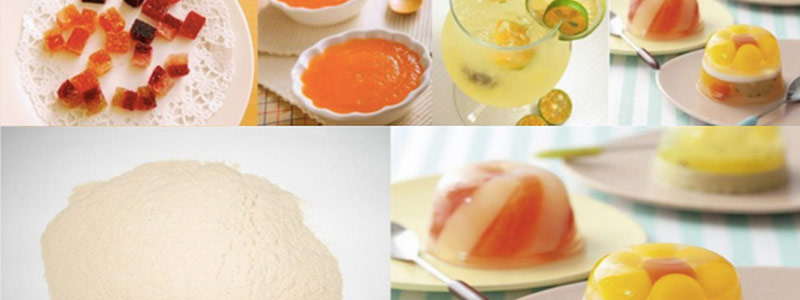
Citrus pectin summary
The growing demand for citrus Citrus pectin manufacturer in the baking and confectionery industry is expected to drive the growth of this market during the forecast period. Pectin is used as a sugar substitute or fat in low-calorie foods and baked jams. The demand for citrus pectin in the confectionery industry is increasing because it is used in jams and jellies to provide a gel-like structure and help release a good taste. Citrus pectin also helps to improve the color, texture and shelf life of confectionery products.
In baked products such as pastries and pastries, the gelling properties of pectin help prevent discoloration and drying out of the fruit. The FDA believes that citrus pectin is safe to use as an emulsifier and thickener.
It is estimated that by 2029, Europe will occupy the largest share of the global citrus pectin market. The gradual increase in the consumption of fiber foods in the region has stimulated the demand for citrus pectin. As the addition of functions in food and beverages is considered a way to improve health in the future, European demand for citrus pectin will continue to grow strongly. The 4 EU countries are the largest consumers of citrus fruits and are expected to bring huge business opportunities to market participants.
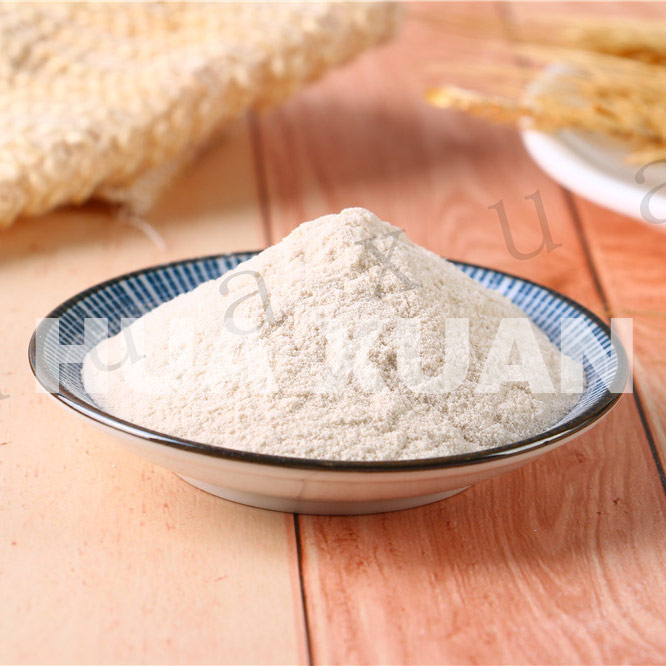
Catalogue:
- The efficacy and role of citrus pectin
- The process of making jam with citrus pectin
- Make jam with citrus pectin processes
- Steps to use citrus pectin to make raspberry fudge
- The production steps of using citrus pectin to make raspberry fudge
- What is pectin?
- Nutrition and use of citrus pectin
- Use of citrus pectin
- Citrus pectin summary
